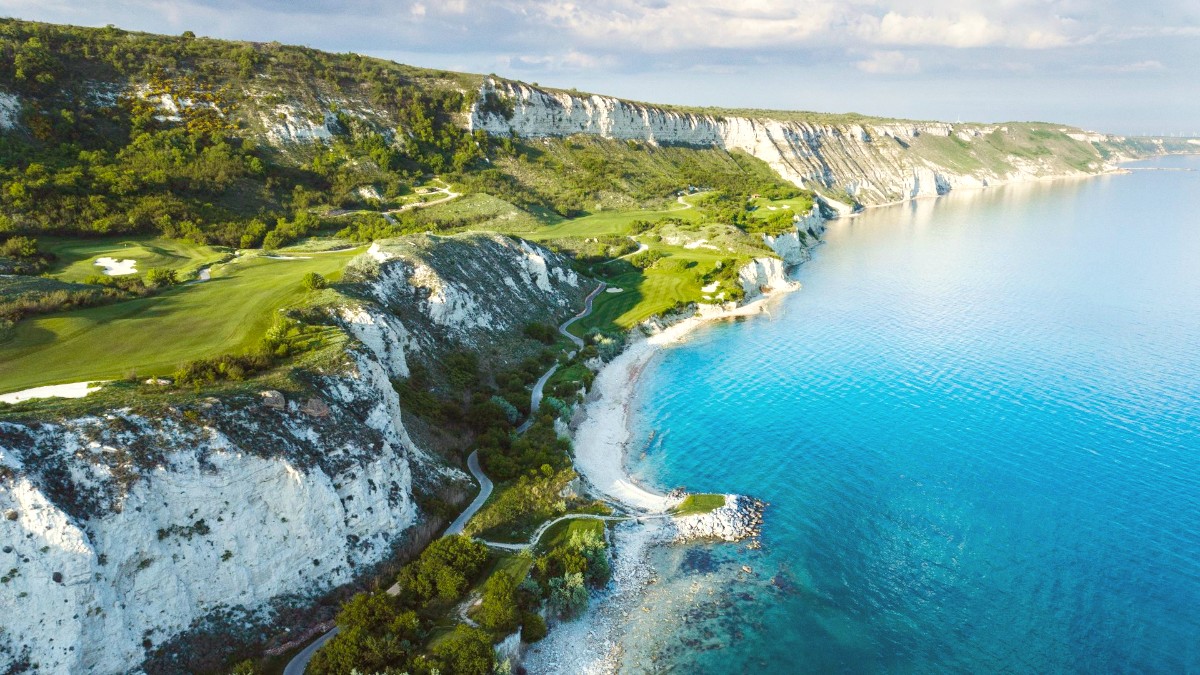
Black Sea Coast, Bulgaria
This is Varna, a dynamic city that perfectly balances its rich past with a forward-looking present. Varna is a cultural hub, a major port, and a gateway to Bulgaria’s Black Sea coast. Travelers seeking both relaxation and discovery find Varna a compelling destination. Its welcoming atmosphere, combined with diverse attractions, makes it a choice for family vacations, cultural explorations, or a solo adventure. Uncover the charm of this Bulgarian treasure, where history breathes and the sea calls.
Varna is a strategic position on the northern shore of the Bay of Varna. It is Bulgaria's third-largest city and the largest urban center along the country's Black Sea coastline. The city rests at the mouth of the Provadiyska River, a location that historically supported its development as a port and trade center. Varna sits approximately 470 kilometers northeast of Sofia, Bulgaria's capital, making it a distinct regional hub.
To the east, the vast expanse of the Black Sea defines Varna's character, providing scenic beauty and economic and recreational opportunities. To the west, Varna Lake, a large liman lake, adds another dimension to the city's geography. Forests and rolling hills border Varna to the north, forming a green backdrop that contrasts with the urban and coastal landscapes. This varied geography presents accessible beaches and nearby natural areas for exploration. The city’s location directly influences its climate, culture, and economy, making it a natural crossroads for maritime trade and tourism within the Black Sea region. The deep bay offers natural protection for the port, enabling Varna to flourish as a maritime gateway for centuries. This blend of sea, lake, river, and hills forms an unique environment for the city's residents and visitors.
The most compelling evidence of Varna’s ancient roots comes from the Varna Necropolis. Discovered accidentally in the 1970s, this burial site yielded what scientists confirm as the oldest processed gold treasure in the world. Dating from 4,600-4,200 BC, these artifacts — including rings, bracelets, and ceremonial objects — belong to a highly sophisticated Copper Age civilization. The discovery challenged previous understandings of early European development, showing complex social structures and advanced craftsmanship existed here far earlier than imagined. It highlights Varna's place at the very genesis of European civilization.
Around the 6th century BC, Greek colonists from Miletus founded the city as "Odessos." It quickly grew into a thriving port and trade center on the Black Sea, facilitating commerce between Greek city-states and the Thracian tribes of the interior. Odessos minted its own coins and developed into a prosperous city-state. Later, in the 1st century AD, the Roman Empire incorporated Odessos into its vast dominion. Under Roman rule, the city maintained its strategic importance, serving as a naval base and a trade hub. The impressive Roman Baths, remains of a large public bath complex, illustrate the grandeur of Roman urban life in Odessos. These ruins, still visible today, offer a direct link to the city's imperial past.
Oldest processed gold treasure from 4,600-4,200 BC.
Founded by Miletus colonists in 6th century BC.
1st century AD, presence of impressive Roman Baths.
Part of Bulgarian Empires and Byzantine rule, Battle of Varna (1444).
Nearly five centuries until 1878, shaping architecture and culture.
Varna gained liberation from Ottoman rule in 1878, becoming part of the newly independent Bulgarian state. This marked the beginning of its modern transformation. In the 20th century, Varna developed rapidly, growing into a major industrial center, a prominent port, and perhaps most notably, a popular resort city. The creation of its famous Sea Garden and the development of numerous hotels along its coastline solidified its reputation as a premier Black Sea destination.
Following the decline of Rome, Odessos, or Varna as it became known, transitioned through various empires. It formed part of the First and Second Bulgarian Empires, experiencing periods of both prosperity and conflict. The Byzantine Empire also held sway over the city at different times, recognizing its strategic coastal position. A distinguished event from this era includes the Battle of Varna in 1444, where a large Crusader army suffered a decisive defeat against the Ottoman forces. This battle decided the fate of the region for centuries and is a significant place in European military history. While the city changed hands, its identity as a Black Sea port remained constant.
Varna came under Ottoman control in the late 14th century, staying so for nearly five centuries until 1878. During this extensive period, it functioned as an important administrative and military center for the Ottoman Empire. The city's port remained active, facilitating trade and troop movements. Ottoman influence shaped Varna's architecture, cuisine, and cultural fabric. Evidence of this era, though less prominent than earlier ruins, exists in some older buildings and traditions. The long Ottoman presence contributed to the diverse heritage that defines Varna today.
Today, Varna combines its historical depth with modern amenities, offering visitors an unique perspective on Bulgaria's journey through time.
Varna today is a dynamic and welcoming city, a modern reflection of its storied past. Its current profile offers travelers a clear picture of what to expect from this lively destination.
As of a 2023 estimate, the city proper has a population of approximately 330,000 residents. The wider Varna Municipality, which includes surrounding towns and villages, has over 475,000 inhabitants. This size makes Varna a bustling urban center, yet it maintains a relaxed coastal vibe, especially outside the peak summer months. The population density means a lively street scene, diverse dining, and a range of local services.
City proper: ~330,000; Municipality: 475,000+
Tourism, maritime transport, shipbuilding, manufacturing, trade, services.
Major port city, cultural hub, university center, extensive Sea Garden.
Varna's economy thrives on several sectors. Tourism stands at the forefront, especially during the summer, drawing visitors to its beaches, resorts, and cultural attractions. The city’s maritime transport sector is robust, with one of Bulgaria's largest ports handling a range of cargo.